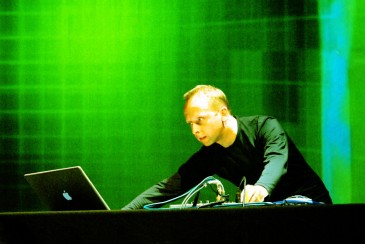
Minus a lackluster set by local trio Sonarchy, this third evening of performances from Vancouver New Music’s Copyright/Copyleft festival was a remarkable gallery demonstrating the deconstruction and reconstruction of contemporary music.
Vancouver’s Holzkopf (a.k.a. Jake Hardy) lit things up with a majestic set of sample-twisting beat alchemy. Hardy hovered over his arsenal of broken tape players, mixers and microphones with an air of divine madness, pulling out blended shards of sudden noise, obliterated vocals and found loops to thrill the austere crowd.
With momentum set in place, famed UK electronics experimentalist Robin Rimbaud (a.k.a. Scanner) took the stage for a sprawling set. Layering his beats with sheets of pulsating static, Rimbaud invited radio transmissions from the past, discarded cell phone messages and morbid, droning synths in, amassing a boundless cloud of sound. Framed by candy-stripe mutations on the screen above the stage, his music had an ethereal, meditative quality that left the audience rapt.
American/Australian composer David Shea closed the evening with two stunning audio-visual compositions. An “all out mixathon,” according to Shea, the first was an electronic revival of early 20th century consciousness. Images of Western industrial adolescence cycled through in film above, while Shea brought the past to life with a ghostly assemblage of forgotten film and television soundtracks. His second piece, an enchanting remixed Javanese version of the Hindu tale Ramayana, nearly lulled the audience into a trance. These were visionary multi-media works, but the most interesting portion of Shea’s performance, and perhaps the evening, came in the form of his tribute to forgotten Canadian experimental film director Arthur Lipsett.
A filmmaker in the employ of the National Film Board in the 1960s, Lipsett was responsible for developing seminal sound and film collages that were influential to avant-garde and remix culture all over the world. Shea trumpeted Lipsett’s great legacy to experimental film and music, lamenting the fact that Lipsett is often left unrecognized for his achievements in the history of subversive art. And with that, Shea departed the stage, leaving the crowd to the blaring juxtapositional truths of Lipsett’s landmark 1961 short film Very Nice, Very Nice, without which the innovations of the evening may not have been possible in the first place. [ed. You can check out Very Nice, Very Nice and other Arthur Lipsett films on the NFB website.]

